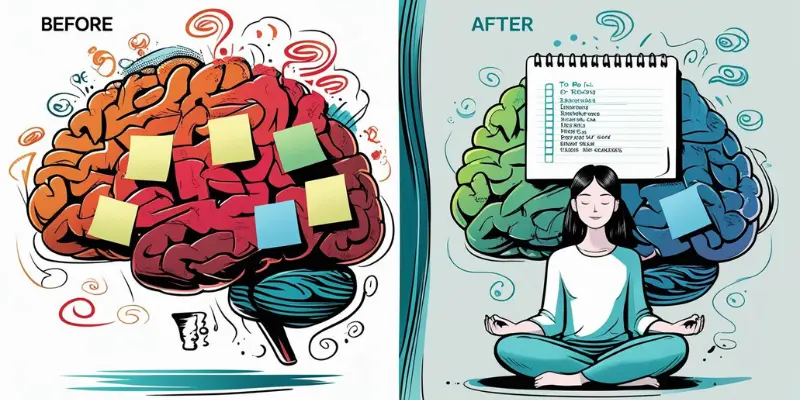The Sunday Reset: Plan Your Week for Maximum Impact & Minimum Stress (A Science-Backed Guide)
Published: 21/07/2025
As Sunday evening rolls in, you feel it—the familiar weight of dread settling in, creeping through your mind. The looming thoughts of the upcoming workweek, the never-ending to-do list, and the pressure to perform. You find yourself mentally scrambling, trying to prepare for Monday morning. It’s a sinking feeling, one that’s all too common among professionals and students alike. This is the Sunday Scaries—a phenomenon that leaves you anxious, stressed, and exhausted before the week even begins.
But what if there was a way to break this cycle? A method to take back control of your Sundays, reset your mind, and start the week feeling calm, clear, and productive?
The Problem: Mental Clutter & Decision Fatigue
The root of Sunday Scaries lies in unchecked mental clutter, constant decision fatigue, and poor preparation. These are more than just bad habits; they actively deplete your brain’s precious resources. When your mind is overwhelmed by a laundry list of tasks, worries, and to-dos, it triggers a spike in stress hormones like cortisol. This not only leaves you feeling exhausted but also impairs your creativity, focus, and productivity throughout the entire week. You’re walking into Monday already mentally drained, which sets the tone for a stressful, unproductive week.
The Solution: Neuro-Optimized Sunday Reset
Here’s the good news: There is a way out. Enter the Neuro-Optimized Sunday Reset—your proactive, science-backed antidote to the Sunday Scaries. This isn’t just another item on your to-do list; it’s a strategic ritual designed to soothe your nervous system, prime your brain for peak performance, and build resilience against the stresses of the week ahead. With this reset, you’ll set yourself up for success before the week even begins.
What You’ll Learn
In this guide, you’ll uncover the neurological “why” behind each step of the Sunday Reset—understanding how small, science-backed actions can have a profound impact on your mental and physical well-being. You’ll also find actionable, easy-to-implement strategies that cover every aspect of your life: from managing mental clutter and improving your environment to fueling your body and mind. By the end, you’ll have a roadmap to achieve sustained calm, clarity, and maximum impact—all while reducing stress and boosting productivity week after week.
The Science Behind Your Calm: How a Sunday Reset Rewires Your Brain
By establishing a predictable routine, you essentially calm the chaos in your brain. Routines provide structure, which allows your mind to let go of constant decision-making. This predictable flow reduces the cognitive load and frees up mental space, allowing your brain to focus on higher-level tasks. When your brain feels in control and not overwhelmed by uncertainty, it can switch from a state of constant alert to one of relaxation, setting the stage for a more productive and less stressful day.
Why Routines Soothe Your Amygdala: The Brain’s Comfort Blanket
Imagine your brain as a bustling office filled with constant tasks and endless decisions. Now, imagine if every small decision you made created a new sticky note on your desk—soon, your workspace becomes cluttered, and you feel overwhelmed. This is how the brain works when it’s not following a predictable routine. The constant uncertainty puts the amygdala—the brain’s fear center—on high alert, triggering anxiety and stress.
Routines, on the other hand, act like a comfort blanket for your brain. When your actions become predictable, your amygdala can relax. This is because predictability reduces cognitive load. Instead of constantly deciding what to do next, your brain can switch into a mode of automaticity. Your prefrontal cortex, which is responsible for planning and higher-order thinking, can then operate more efficiently, enabling you to handle more complex tasks and think more clearly. This reduces the anxiety of “what’s next?” and allows you to face challenges with greater confidence.

Real-World Example: The Comfort of Routine
I used to feel an overwhelming sense of anxiety each Sunday night, as I would scramble to figure out what my week would look like. I’d find myself checking emails, setting up meetings last-minute, and worrying about forgotten tasks. But when I established a simple Sunday evening routine—planning my week, prepping my to-do lists, and organizing my workspace—my stress levels dropped significantly. I felt ready to face Monday without the usual dread because I knew exactly what to expect. The predictability of my routine provided the structure I needed to reduce my mental clutter.
Cortisol & Cognitive Offloading: Why Planning Reduces Stress
If you’ve ever had an entire day full of mental tasks—emails, meetings, chores, appointments—you’ve probably noticed that your brain gets fatigued, and your ability to focus deteriorates. This happens because of mental “open loops”—unattended tasks or decisions that are still “floating” in your mind. Your brain is trying to hold onto them, creating a constant state of alertness that spikes cortisol, the stress hormone.
By planning ahead and completing small tasks during your Sunday Reset, you offload much of that mental burden. This frees up your working memory, the cognitive space you need to tackle new problems without feeling overwhelmed. Think of it as emptying your trash can before it overflows—planning and completing tasks reduces the risk of emotional burnout by ensuring nothing gets left behind.
Research Suggestion: Studies have shown that cluttered environments significantly raise cortisol levels, increasing stress and reducing focus. A clean and organized space doesn’t just look good—it can literally lower your stress.
Boosting Dopamine & Serotonin: The Joy of Small Wins & Anticipation
One of the most powerful things about the Sunday Reset is that it activates the brain’s neurochemical reward system. Each small task you complete—whether it’s organizing your workspace, making your grocery list, or reviewing your calendar—releases dopamine, the “feel-good” neurotransmitter. This creates a positive feedback loop that encourages you to keep going. The brain craves these small wins, and as you accumulate them, you feel more accomplished and motivated.
Additionally, anticipation plays a big role. Just knowing that your week is planned and that you have a roadmap to follow can significantly boost your serotonin levels, a neurotransmitter that regulates mood. This increase in serotonin can make you feel calmer, more content, and ready to take on any challenges with a positive mindset.
As you move through your Sunday Reset, you’ll find that your brain is not only calmer but more productive, all thanks to the neurochemical rewards that come with planning, accomplishing small tasks, and anticipating a successful week ahead.
By understanding how routines, planning, and neurochemical rewards shape our brain’s responses, the Neuro-Optimized Sunday Reset becomes not just a task list—it’s a scientifically-backed method for rewiring your brain to thrive, week after week.
Crafting Your Neuro-Optimized Sunday Reset: Actionable Steps for Lasting Impact
Your Neuro-Optimized Sunday Reset is about more than just creating a to-do list—it’s a systematic approach to calm your mind, enhance focus, and prime your body for peak performance. Below are the key steps to craft a reset that maximizes your productivity and emotional well-being for the week ahead.
Phase 1: Prime Your Mind & Body (Internal Calibration for Peak Performance)
To optimize your mind and body for peak performance, it’s essential to clear the mental clutter that holds you back. A simple yet powerful technique, the brain dump, serves as the perfect tool to declutter your mind and prepare it for a focused, productive day ahead.
The Brain Dump: Your Mental Defragmentation Tool
- What it is: The brain dump is exactly what it sounds like—getting all your thoughts, tasks, worries, and ideas out of your head and onto paper or a digital list. This simple step frees up mental space, so you’re not carrying around a jumbled collection of unaddressed tasks.
- Why it works (Neuroscience): Our brains are not built to hold onto endless thoughts or unresolved tasks. The brain dump reduces cognitive noise, allowing your working memory to focus on the present. By preventing rumination, it helps you move forward without being mentally burdened by what’s undone.
- How to do it:
- Find a quiet space and take a few deep breaths.
- Write down everything that’s on your mind, from work tasks to personal worries to creative ideas.
- Don’t worry about organizing them; just get them out of your head.
- Review your list, then prioritize or delegate where necessary.
Taking just 10-15 minutes for this exercise can clear your mental space and prepare you for deeper focus.

Intentional Hydration & Nourishment: Fueling Your Brain for Focus
- Why it’s crucial (Science): Dehydration can negatively impact cognitive function, energy, and mood. Our brains are highly sensitive to even small drops in hydration, leading to brain fog, irritability, and difficulty concentrating. Proper nourishment also fuels your brain with the nutrients it needs to think clearly.
- How to prep:
- Batch healthy snacks: Prepare a few nutrient-dense snacks (like nuts, fruit, or veggies) ahead of time so that you’re always ready with a brain-friendly option.
- Hydration strategy: Aim to drink water consistently throughout the day. Start your morning with a glass of water to hydrate after a night of sleep. Consider carrying a water bottle to keep you on track.
Simple hydration and nourishment can significantly boost your energy and focus, setting you up for success.
Mindful Movement or Stillness: Activating Your Parasympathetic Nervous System (PNS)
- Why it calms (Science): When you’re under stress, your body activates the sympathetic nervous system, triggering the “fight or flight” response. Activities that focus on mindful movement or stillness activate the parasympathetic nervous system (PNS), shifting your body into a more relaxed, calm state (the “rest and digest” mode). This helps lower cortisol and balance your emotions.
- How to integrate:
- Gentle stretching or a short walk can activate the PNS, especially when you focus on your breath during these activities.
- Consider adding a 5-10 minute breathing exercise. For example, the 4-7-8 breath:
- Inhale through your nose for 4 seconds,
- Hold your breath for 7 seconds,
- Exhale through your mouth for 8 seconds.
Repeat 4-5 times.
These simple practices can lower your stress and prime you for a calm and productive day ahead.
Phase 2: Optimize Your Environment & Logistical Command (External Control for Mental Ease)
Creating an organized environment is just as important as organizing your mind. By taking control of your physical space, you can reduce stress and increase focus, setting the stage for a more productive and peaceful day ahead.
Targeted Decluttering: The 15-Minute Clarity Boost
- Why a tidy space matters (Science): Visual clutter contributes to cognitive load, leading to stress and decreased focus. Your brain associates disorder with unfinished tasks, which raises cortisol and diminishes your ability to concentrate.
- How to approach it:
- Set a timer for 15 minutes and focus on decluttering key areas that impact your daily life, such as your desk, bedside table, or kitchen counter.
- Quick wins: Prioritize high-traffic areas where clutter accumulates. Don’t aim for perfection—just clearing surfaces can make a huge difference in your mental clarity.
- Real-World Example:
After I started clearing my desk every Sunday, I noticed a huge difference in my productivity on Monday morning. What once felt like an overwhelming task was now a calm, organized workspace ready for the week.
Laundry & Wardrobe Pre-flight: Reducing Morning Decision Fatigue
- Why it saves brainpower: Each small decision we make throughout the day adds up. Morning decision fatigue can leave us drained before we even start the day. Pre-selecting outfits and ensuring you have clean clothes ready for the week helps eliminate those unnecessary choices.
- How to streamline:
- Plan outfits on Sunday evening, so you’re not scrambling in the morning.
- Efficient laundry cycling: Consider doing smaller loads throughout the week to avoid the overwhelm of a big laundry day.
- Wardrobe planning: Set aside 10 minutes to decide what you’ll wear each day, keeping it simple but stylish.
Streamlining your wardrobe choices can save you valuable brainpower for more important decisions throughout the day.
Digital Hygiene Audit: Clearing Your Online Clutter
- Why digital clutter drains you (Science): Excessive digital noise—from endless notifications to disorganized files—creates mental overwhelm, leading to distraction and stress. The more you manage your digital environment, the easier it is for your brain to focus on the present moment.
- How to declutter:
- Delete unused apps and organize your phone’s home screen for ease of access.
- Unsubscribe from email lists that you don’t engage with.
- Organize files on your devices—keep only what you use frequently.
- Charge your devices overnight, so you start the day ready to go without digital distractions.
A quick digital clean-up can save you hours of mental clutter and increase your ability to focus.
“Life Admin” Lightening Round: Conquering Nagging Worries
- Why it boosts control: Small administrative tasks, such as handling bills, appointments, and emails, often hover in the background, triggering low-level anxiety. Addressing them proactively clears up your mental space and reduces persistent worries.
- How to tackle:
- Review your calendar and respond to urgent emails.
- Sort through physical mail to ensure you’re not holding onto unnecessary papers.
- Set aside 10-15 minutes to knock out any small, lingering admin tasks.
This small action can give you the peace of mind you need to move through your week without lingering distractions.
Phase 3: Recharge & Reflect (Sustainable Calm for Long-Term Resilience)
Achieving long-term resilience starts with giving your mind and body the space to recover. By incorporating regular self-care into your routine, you recharge not only your physical energy but also your emotional well-being, ensuring you’re ready to face the week ahead with clarity and strength.
Personalized Self-Care Ritual: Your Brain’s Reward System
- Why it’s non-negotiable (Science): Self-care is crucial for nervous system repair and emotional regulation. When you take time for activities that replenish you, you reinforce your brain’s reward system, boosting motivation and preventing burnout.
- How to choose:
- Select activities that you genuinely enjoy, such as a relaxing bath, reading, or engaging in a creative hobby.
- Consider a calming mocktail or a cozy, mindful journaling session to help wind down.
The goal is to find something that makes you feel nourished, both mentally and physically, preparing you for the challenges of the week.

Review & Refine: Looking Ahead with Clarity (The Future-Pacing Brain)
- Why it works (Science): Reviewing your schedule for the upcoming week and setting clear intentions helps your brain prepare for what’s ahead. This reduces uncertainty and ensures you’re mentally prepared for any challenges.
- How to do it:
- Take a glance at your calendar and identify 1-3 key priorities for the week.
- Jot down a couple of intention-setting thoughts to stay focused and grounded.
By anticipating the week ahead, you can head into it feeling prepared and confident.
Optimal Wind-Down: Priming for Deep, Restorative Sleep
- Why sleep is brain food (Science): Sleep plays a critical role in memory consolidation, emotional regulation, and brain detoxification. A restful night primes your brain for optimal performance the next day.
- How to prepare:
- Dim the lights an hour before bed to signal to your brain that it’s time to wind down.
- Avoid screens at least 30 minutes before sleep.
- Maintain a consistent bedtime to regulate your sleep cycle.
A well-structured evening routine can ensure that you wake up feeling restored and ready for a productive week.
By incorporating these three phases—priming your mind and body, optimizing your environment, and recharging and reflecting—you’ll create a Neuro-Optimized Sunday Reset that builds resilience and primes you for a productive, stress-free week.
Expert Insights & Avoiding Common Reset Pitfalls
As you embark on your Neuro-Optimized Sunday Reset, it’s essential to acknowledge a few potential pitfalls that may derail your progress. These common challenges—the perfection trap, resentment towards the reset, and guilt from missing a reset—are obstacles many people face when trying to build a new routine. But don’t worry—each challenge can be overcome with the right strategies. Let’s dive into how to address these pitfalls so your reset becomes a sustainable and effective part of your week.
The Perfection Trap: Why “Good Enough” is Your Brain’s Best Friend
- The Problem:
It’s easy to fall into the trap of thinking your reset needs to be perfect. You might set lofty goals, over-schedule your Sunday, or become obsessed with checking off every task. While it’s natural to strive for success, this mindset can lead to burnout, self-criticism, and eventually abandoning the routine altogether. Perfectionism often creates unnecessary pressure, leaving you feeling like you’re failing if every single detail isn’t perfect. - The Solution (Science-Backed):
The key here is adopting the “Rule of Three”. Instead of trying to complete a long list of tasks, choose just three key priorities for your Sunday Reset—things that will make the biggest impact. This strategy works because it aligns with the brain’s natural tendency to seek achievable goals, and it reduces overwhelm. Celebrating these small, achievable wins triggers a release of dopamine, the “feel-good” neurotransmitter, which boosts intrinsic motivation and makes the process feel rewarding. - Personal Anecdote Idea:
In my early attempts at a Sunday reset, I often tried to accomplish too much—organizing every drawer, meal prepping for the entire week, and setting up my calendar in detail. By the end of the day, I felt exhausted, frustrated, and overwhelmed. I quickly realized that this approach wasn’t sustainable. After shifting to the Rule of Three, I focused on just three impactful tasks each Sunday: planning my week, cleaning my desk, and preparing a few meals. This approach was much more achievable, and I found that the small wins gave me a sense of accomplishment without the burnout.
From Chore to Choice: Making Your Reset Enjoyable (Neurochemical Rewards)
- The Problem:
The Sunday Reset can feel like just another chore if it’s not enjoyable. If it feels forced or like an obligation, it may lead to resentment. This makes it harder to stick to the routine in the long term. When tasks feel like chores, your brain associates them with stress rather than positive outcomes, making it difficult to get into the flow. - The Solution (Science-Backed):
Sensory pleasures can transform your reset from a chore into something you look forward to. Incorporating music, aromatherapy, or even enjoying a comforting drink during your reset activates different brain areas, enhancing the experience and building positive associations with your routine. For example, the scent of lavender or a cup of herbal tea can activate your brain’s reward system, making the process feel more pleasant and less like a task. - How to Make It Enjoyable:
- Music: Create a calming playlist or play your favorite tunes while you tackle your Sunday reset.
- Aromatherapy: Use essential oils like lavender, peppermint, or citrus to create a relaxing atmosphere.
- Comforting Drink: Sip on a cup of tea or your favorite warm beverage while you work through your reset tasks.
By adding these elements, you’ll make your Sunday Reset a sensory ritual that your brain actually craves.
The Bounce-Back Plan: What to Do When You Miss a Reset
- The Problem:
Life happens, and sometimes you’ll miss your reset altogether. Whether you’re busy or simply forget, you may feel guilt for skipping a week. This feeling of failure can be discouraging, leading you to abandon your routine entirely. It’s easy to fall into a cycle of guilt and self-blame, but this won’t help you make a comeback. - The Solution (Science-Backed):
Self-compassion is key when you miss a reset. Flexibility is critical in forming a sustainable routine—life doesn’t have to be perfect. Studies show that when you practice self-compassion, you’re more likely to bounce back from setbacks. The key is to quickly return to the routine, as doing so strengthens positive neural pathways and builds long-term resilience. - Quick Fixes for a “Mini-Reset”:
If you don’t have time for a full reset, try these mini-reset actions to stay on track:- Brain Dump (5 minutes): Even if you’re pressed for time, spend a few minutes writing down your thoughts.
- Tidy Up a High-Impact Zone (5 minutes): Focus on just one area of your space, like your desk or entryway.
- Quick Hydration & Snack (5 minutes): Drink a glass of water and eat a healthy snack to fuel your brain.
Even a mini-reset will help you get back on track without feeling like you’ve fallen behind.
By understanding these common pitfalls and learning how to navigate them, you can ensure that your Neuro-Optimized Sunday Reset becomes a sustainable, enjoyable ritual rather than a source of stress. Remember, flexibility, small wins, and self-compassion are your allies in making this routine a long-term success.
Your Best Week Starts Now: Embrace the Power of the Sunday Reset
The Neuro-Optimized Sunday Reset isn’t just about checking off tasks on a to-do list; it’s a transformative practice that rewires your brain for calm, clarity, and sustainable productivity. By proactively organizing your thoughts, prioritizing self-care, and preparing your environment, you’re not only setting yourself up for a productive week—but also boosting your mental resilience for the challenges ahead. This reset is designed to alleviate stress, enhance focus, and help you enter the new week with a sense of control and intention.
Core Benefit: Your Secret Weapon Against Overwhelm
This intentional ritual is your secret weapon for overcoming the overwhelm that so many professionals and students face. By incorporating small, science-backed steps each Sunday, you’ll build a routine that minimizes stress, reduces decision fatigue, and maximizes your ability to perform. With this reset, you can create a calmer, more productive week—and do so week after week.
Are you ready to experience the difference? It’s time to unlock your full potential and start your neuro-optimized Sunday Reset this weekend.
Which science-backed step will you try first? Let us know in the comments or share your experience with others!
By taking action today, you’ll ensure that each week is filled with calm and clarity, allowing you to tackle challenges with confidence and achieve lasting success.
Maximize Your Calm: Everything You Need to Know About the Sunday Reset
The Sunday Reset helps clear mental clutter, set priorities, and create a routine that primes your brain for success. By taking time to organize, plan, and prepare, you ensure a calm, focused start to the week, making your days more productive.
Establishing routines on Sunday decreases uncertainty and cognitive load, helping reduce anxiety. By making your week predictable, you allow your brain to focus on more important tasks, rather than being overwhelmed by decisions.
Planning ahead activates your brain’s reward system, boosting dopamine levels and providing a sense of accomplishment. It also reduces cortisol, the stress hormone, by offloading tasks from your working memory and minimizing stress throughout the week.
Yes! A Sunday Reset transforms the anxious feelings of dread into a calm, controlled start to the week. By addressing mental clutter, planning your schedule, and preparing your environment, you can alleviate the anxiety that often accompanies Sundays.
The reset helps reduce stress and anxiety by providing structure and a sense of control. This not only boosts productivity but enhances mental clarity and emotional resilience, allowing you to handle challenges more effectively.
Start with a brain dump: write down all your tasks, thoughts, and worries. This clears your mental space and sets the stage for a focused, organized week.
Absolutely! The Sunday Reset is about balance—incorporating small, enjoyable steps (like a cup of tea, listening to music, or light stretching) while preparing for the week ahead. It shouldn’t feel like a chore; it should enhance your weekend.
A full reset can take anywhere from 30 minutes to 2 hours, depending on how much you need to prepare. It’s flexible—you can tailor it to your schedule by focusing on essential tasks for a quicker reset.
Life happens, and missing one reset isn’t the end of the world. The key is to practice self-compassion—don’t let guilt derail your progress. You can always do a mini-reset by tackling a couple of key tasks to get back on track.
Absolutely. Your Sunday Reset should evolve based on your needs. As your life changes, adjust your routine to fit your current situation. The goal is to make it a sustainable, adaptable ritual that works for you.

- Be Respectful
- Stay Relevant
- Stay Positive
- True Feedback
- Encourage Discussion
- Avoid Spamming
- No Fake News
- Don't Copy-Paste
- No Personal Attacks

- Be Respectful
- Stay Relevant
- Stay Positive
- True Feedback
- Encourage Discussion
- Avoid Spamming
- No Fake News
- Don't Copy-Paste
- No Personal Attacks




